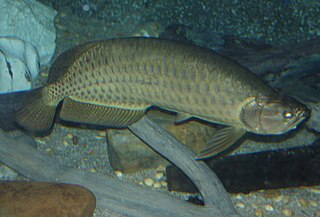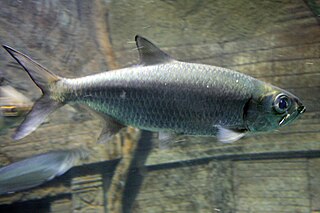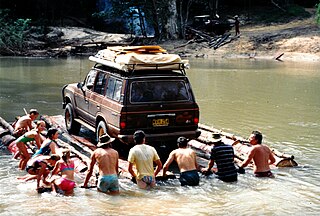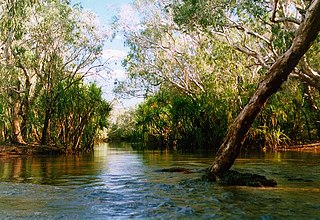See also
- Barramunda or Australian lungfish (Neoceratodus forsteri)
- Barry Munday , 2010 American comedy film
Barramundi (Lates calcarifer) is a saltwater fish of the Indian and western Pacific oceans also called the Asian sea bass. Barramundi, meaning "large-scaled river fish", may also refer to:
Sea bass is a common name for a variety of different species of marine fish. Many fish species of various families have been called sea bass.

The Asian arowana comprises several phenotypic varieties of freshwater fish distributed geographically across Southeast Asia. While most consider the different varieties to belong to a single species, work by Pouyaud et al. (2003) differentiates these varieties into multiple species. They have several other common names, including Asian bonytongue, dragonfish, and a number of names specific to the different color varieties.

Scleropages jardinii, the Gulf saratoga, Australian bonytongue, Pearl arowana or northern saratoga, is a freshwater bony fish native to Australia and New Guinea, one of two species of fishes sometimes known as Australian arowana, the other being Scleropages leichardti. It has numerous other common names, including northern saratoga, toga and barramundi. It is a member of the subfamily Osteoglossinae, a (basal) teleost group. Its scientific name is sometimes spelled S. jardini.

The barramundi, Asian sea bass, or giant sea perch, is a species of catadromous fish in the family Latidae of the order Perciformes. The species is widely distributed in the Indo-West Pacific, spanning the waters of the Middle East, South Asia, Southeast Asia, East Asia, and Oceania.

Lake Argyle is Western Australia's largest and Australia's second largest freshwater man-made reservoir by volume. The reservoir is part of the Ord River Irrigation Scheme and is located near the East Kimberley town of Kununurra. The lake flooded large parts of the Shire of Wyndham-East Kimberley on the Kimberley Plateau about 80 kilometres (50 mi) inland from the Joseph Bonaparte Gulf, close to the border with the Northern Territory.

The southern saratoga, also known as the spotted bonytongue, spotted saratoga, or simply saratoga, is a freshwater bony fish native to Australia. It belongs to the subfamily Osteoglossinae, or arowanas, a primitive group of teleosts. Like all arowanas, it is a carnivorous mouthbrooder. Along with the gulf saratoga, the saratoga is also known as the Australian arowana and barramundi, although the latter name is nowadays reserved in Australia for the unrelated Lates calcarifer.
Snapper(s) may refer to:

The Indo-Pacific tarpon, also known as the oxeye herring or simply herring due to its superficial resemblance to the true herrings, of which it is not a member, is the smaller of the two species of tarpon and lives in Indo-Pacific waters.

The mangrove red snapper, also known as mangrove jack, grey snapper, creek red bream, Stuart evader, dog bream, purple sea perch, red bream, red perch, red reef bream, river roman, or rock barramundi, is a species of marine ray-finned fish, a snapper belonging to the family Lutjanidae. It has a wide Indo-Pacific range and has recently been recorded in the eastern Mediterranean Sea.
The Staaten River is a river in northern Queensland, Australia, rising in the Great Dividing Range and flowing northwest into the Gulf of Carpentaria.

Monodactylus argenteus is a species of fish in the family Monodactylidae, the moonyfishes. Its common names include silver moonyfish, or silver moony, butter bream, and diamondfish. It is native to the western Pacific and Indian Oceans, including the Persian Gulf, Red Sea, and associated estuaries, such as the Mekong Delta.

The Mary River flows in the Northern Territory of Australia and is a site of the Mary River National Park.
The Archer River is a river located on the Cape York Peninsula, Far North Queensland, Australia.

The Wenlock River is a river located on the Cape York Peninsula in Far North Queensland, Australia.

Tarpon are fish of the genus Megalops. They are the only members of the family Megalopidae. Of the two species, one is native to the Atlantic, and the other to the Indo-Pacific Oceans.

The Tonda Wildlife Management Area is a wetland of international importance and the largest protected area in Papua New Guinea. It is located in the south-western corner of the Western Province and is contiguous with Wasur National Park of Indonesia. It forms part of the Trans Fly savanna and grasslands ecoregion.

The Goyder River is a river in the Northern Territory of Australia.
The Jackey Jackey Creek, also often called Jacky Jacky Creek, is a creek in the Cape York Peninsula region of Far North Queensland, Australia.
Silver bream is the common name of several species of fish:

Crocosaurus Cove is a crocodile herpetarium and aquarium zoo located in an indoor complex in the city district of Darwin, Northern Territory, Australia. Its main focus as the facility's name indicates is the tourism drawcard of the crocodiles of northern Australia. The park has a considerable number of saltwater crocodiles including 700kg and 5.1 metre long male Burt, who appeared in 1986 movie Crocodile Dundee and made news in 2018 for 'psychic predictions' outcomes of the 2018 Soccer World Cup by reaching up and grabbing photographs of players which was seen as match and player performance 'predicting'. The facility has also had success with breeding and hatching baby crocodiles including in July 2022 with baby crocodiles hatched to parent crocodiles female Kate and male William. One of the things most well known at the facility which significantly increased visitor numbers is a 'cage of death' experience where paying visitors can swim in water with large crocodiles while protected from physical contact with them by being enclosed behind a glass safety dome. As previously mentioned a significant number of other native Australian reptiles are also kept at the facility and publicly exhibited. Mick Burns the owner is also owner of Darwin Crocodile Farm.